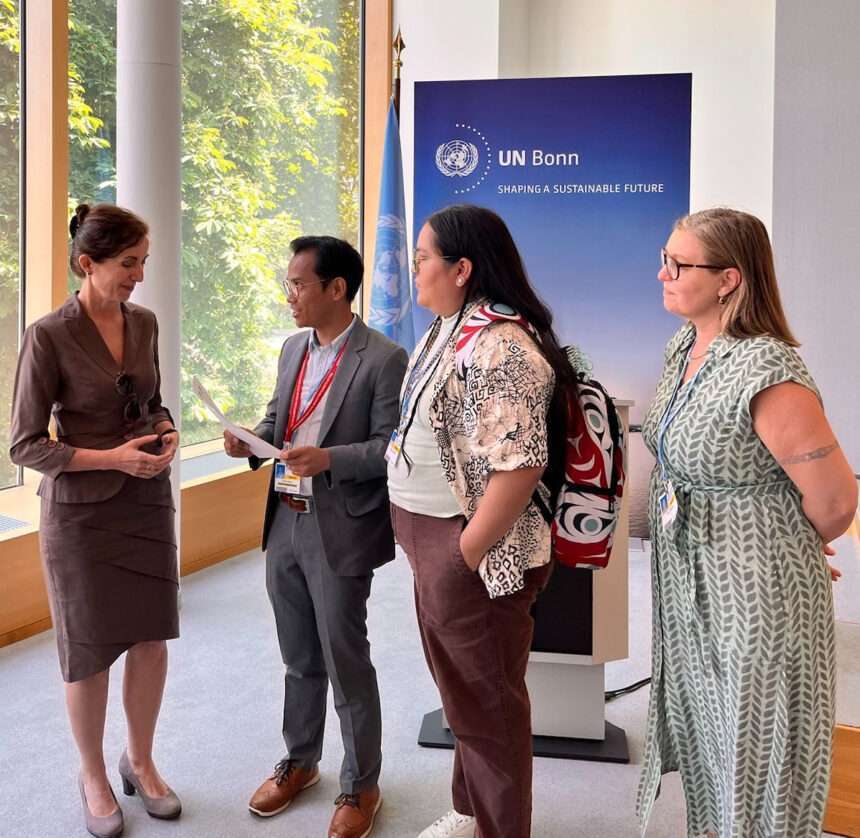UNFCCC Director of Communications and Engagement Ina Parvanova receives letter from It Takes Roots delegates Adrien Salazar (GGJ), Brenna Twobears (IEN) and Tamra Gilbertson (IEN). Photo credit: It Takes Roots
Since the United Nations Framework Convention on Climate Change (UNFCCC) announced Dr. Sultan al-Jaber, the CEO of Saudi Arabia’s national oil company, as the president of the 28th session of the Conferences of the Parties (COP28), climate activists and policy experts have expressed dismay at the stark conflict of interest in his appointment. Sultan al-Jaber and other Emirates representatives shared plans to promote fuller participation from oil and gas companies in the climate talks. And most recently, scandal broke out over Saudi Arabia’s national oil company having access to incoming and outgoing emails to the COP28 office.
While mainstream media has spotlighted the justified outrage over oil interests’ control over COP28, environmental justice activists have broader concerns over multiple industries’ influence at the UNFCCC. The Just Transition Alliance and our sister alliances in the It Takes Roots Coalition have been tracking corporate co-optation of the United Nations climate talks for years. We recently shared ideas for improvement with the UNFCCC, including the following guidance: in order to ensure COP28’s accountability to those on the frontlines of climate change, the UNFCCC must stop supporting polluter-oriented entities and false solutions and leave fossil fuels in the ground.
Based on past climate talks, a host of false solutions will be promoted at COP28. As our strategy advisor Ananda Lee Tan recounted, “While the agenda at COP 26 in Scotland was driven by the global banking sector pushing net zero commitments from investors, COP 27 was opened up as a marketplace for American and European corporations, investors and accounting firms looking to make a buck by peddling their techno-fixes and shady services to poor nations seeking climate adaptation funding.” Techno-fixes refer to new, unproven methods of addressing climate change that serve corporate and political powers and divert resources from the real solution, which is leaving fossil fuels in the ground according to experts.
Carbon capture and sequestration (CCS) is a techno-fix taking precedence in the US climate agenda and the UNFCCC forum. The United States House of Representatives Committee on Oversight and Reform recently revealed how the fossil fuel industry uses carbon capture to hide its impact on climate. According to the report, “Shell’s plans … remain heavily reliant on unproven methods of removing carbon from the atmosphere, such as carbon capture technology, and buying credits in not-yet-existent carbon markets to plant trees to offset its emissions.” As such, carbon capture provides a “‘social license’ to continue producing fossil fuels,” allowing the industry to keep polluting under the guise that their emissions are offset. Hoodwinked in the Hothouse expands on issues with carbon capture and other false solutions such as net zero emissions schemes, carbon markets, hydrogen, and nuclear energy taking center stage at COP28. The UNFCCC must check obstructive corporate and political forces and catalyze policies that keep fossil fuels in the ground in order to protect the communities and workers on the frontlines of climate change.
The UNFCCC must move away from supporting polluting entities and solutions that harm frontline communities in order to develop just, democratic and sustainable guidelines for climate change. The It Takes Roots Coalition advocated this and more in a letter we delivered to the UNFCCC Secretariat during the UN climate talks in Bonn (SB58). In response to pressure from climate activists to address corporate co-optation of COPs, the UNFCCC moved to enhance transparency. According to It Takes Roots delegate Adrien Salazar:
“[W]hat accomplishments were made at Bonn, including the new rules mandating disclosure of affiliation for all COP participants, and the recognition that human rights must be respected in all UNFCCC meetings, is the result of movements relentlessly pushing to respect human rights, and kick big polluters out of COP. Bonn is a step forward in these areas, and much more will need to be done going into COP28.”
The new rules stipulating mandatory disclosure of affiliation aim to curtail the unchecked influence of large numbers of fossil fuel lobbyists at the climate talks, an important step toward achieving global phaseout of fossil fuels. By heeding environmental justice advocates’ demands and deprioritizing false solutions, the UNFCCC can facilitate just climate policies that prioritize those on the frontlines of climate change.

